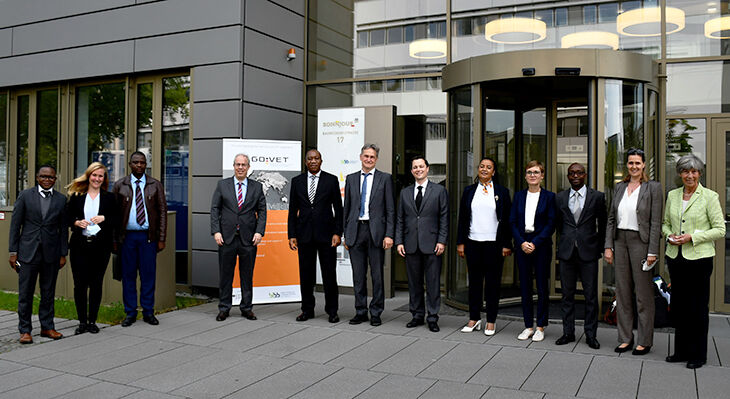High level interest in the German VET system from Mozambique
22.07.2022
The Mozambican State Secretary for Vocational Education and Training visited BIBB together with a seven-strong delegation in order to obtain greater familiarity with the VET system in Germany. Highly interesting specialist presentations and stimulating discussions provided new insights and impetuses on all sides.

A Mozambican delegation headed by Agostinho Francisco Langa Júnior, State Secretary for Vocational Education and Training, visited the Federal Institute for Vocational Education and Training (BIBB) at the beginning of May. The visit formed part of a one-week study trip organised by the German Corporation for International Cooperation (GIZ) in order to enable the group to learn more about the structure and specific characteristics of the German VET system whilst focusing on dual training in particular.
Mozambique gained independence in 1975 and has a very young population, of which young people aged between 15 and 24 make up 20.6 percent. Against this background, State Secretary Langa Júnior described the necessity of driving forward vocational education and training in the country. He explained that a new State Secretariat for Vocational Training had been established in November 2020 under the leadership of the Ministry of Science and Technology Higher and Technical and Professional Education (MCTESTP). The areas of responsibility of individual stakeholders in the Mozambican VET system, which were varied and unclear in some cases, presented one of the major challenges.
Vocational training administration in Mozambique
Different ministries and institutes are involved in the administration and development of the vocational education and training system in Mozambique. The MCTESTP and the Ministry of Labour, Employment and Social Security (MITRAB) manage the Mozambican VET system jointly via the National Institute for Employment and Professional Training (INEFP). Informal VET in the country currently forms the main remit of the INEFP. Responsibility for formal vocational education and training rests with the National Directorate for Professional Technical Education (DINET) under the auspices of the MCTESTP. The tasks of DINET include the development of policy strategies and the design and revision of materials and curricula.
GOVET Head Dr. Ralf Hermann provided the delegation with a specialist introduction. Following a presentation of the work performed by BIBB and GOVET within the context of national and international VET cooperation, the talk turned to targeted consultancy topics. Peter Rechmann (Deputy Head of GOVET) explained the collaboration that takes place between stakeholders in German vocational education and training, something that many countries view as a key characteristic of the system. He also described the precise course of dual VET to the delegation and outlined the way in which training regulations and curricula are drawn up. The participants were especially interested in the fact that young people in Germany are able to switch between career pathways. Young people in Mozambique who opt to enter vocational education and training upon completion of their nine years of mandatory general schooling are generally not able to return to academic education. The delegation was further impressed by the close integration of the private sector and by the high financial contribution to VET which is borne by German companies. Dr. Andreas Werner (Head of iMOVE) presented examples of best practice from the international networking activities undertaken with German education and training providers. He then went on to set out the spectrum of services provided by iMOVE Training Made in Germany.
Reporting as a basis for governance
German dual vocational education and training is based on five core principles, which ensure the success of the system. One of these is institutionalised research and consultancy services, part of the original task area of BIBB. Julia Olesen is a Project Head at GOVET, where she is responsible for international cooperation by the Federal Ministry of Education and Research (BMBF) with Ghana and Costa Rica. She used her experiences from this consultancy background (and from other areas) to present the development process and principles of VET reporting to the delegation. Since 1977, BMBF has published an annual Report on Vocational Education and Training in order to document development in VET on an ongoing basis. The aims of reporting of this kind include monitoring the current status of VET, creating an ability to react to any possible imbalance in a timely manner, securing better underlying information for policy decision makers, and identifying trends in the VET system in good time. This means that a well-founded database is in place for the development and governance of general conditions, structures and VET instruments and measures.
Last year, Ghana drew up its first Vocational Education and Training Report in collaboration with GOVET. Julia Olesen reported the process and talked about the experiences gleaned from Ghana. She confirmed the particular importance of advance clarification of the areas of responsibility and competency of the various stakeholders in the vocational education and training system. Ghana adopted a significant VET reform in 2020 in order to serve this purpose.
A Vocational Training Act is also currently being drafted in Mozambique. Objectives being pursued in this regard include a clear division of tasks and closer integration of the private sector. Delegation participants felt that they were better equipped to tackle this project following the specialist presentations and the lively networking.